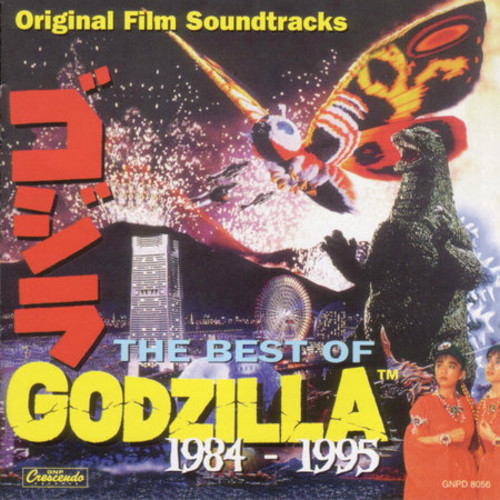The Best of Godzilla Vol. 3 Download
Godzilla, the brute that even a big-budget Hollywood stinkeroo couldn't impale, has been many things in his (her?) illustrious career: nuclear allegory, loving parent, neighborhood pest, property insurance exemption clause. But has-been? That'south what many cynics were calling the Large Lizard by the belatedly '70s. Resurrecting their greenbacks, er, moo-cow after a nine-year hiatus in the mid-'80s, Japan'south Toho Studios wisely moved abroad from the tired stock footage, cheap effects, and kiddie-corn plot lines that had come up to characterize the series, moving the final 7 sagas back to the deadly-serious aesthetic of the original. Ironically, as Gojira's handlers got back to their cinematic roots, the films' music initially moved closer to the Hollywood mainstream, including healthy doses of heroic Korngold-esque romanticism and even screaming, diddly-squeak-school metal guitar. Just after the more than mod, if questionably effective efforts of Reijiroh Koroku and Kohichi Sugiyama (for Return of Godzilla and Godzilla vs. Biollante, respectively), Gojira music godfather Akira Ifukube returned to score four of the series' last five installments, truly bringing the saga full circle; the man who had musically brought the monster to life 41 years earlier was gratifyingly now immune to write information technology's moving Requiem. The annotation and analogy (which equals the high standards of information technology's companion volume 1954-1975) are even more crucial here, as most of these "second cycle" films have seen only spotty distribution exterior their native Japan.
Godzilla, the beast that even a big-budget Hollywood stinkeroo couldn't impale, has been many things in his (her?) illustrious career: nuclear allegory, loving parent, neighborhood pest, property insurance exemption clause. Only has-been? That'southward what many cynics were calling the Big Lizard by the late '70s. Resurrecting their cash, er, cow after a 9-year hiatus in the mid-'80s, Japan's Toho Studios wisely moved away from the tired stock footage, inexpensive effects, and kiddie-corn plot lines that had come to characterize the series, moving the concluding vii sagas back to the deadly-serious aesthetic of the original. Ironically, every bit Gojira'south handlers got back to their cinematic roots, the films' music initially moved closer to the Hollywood mainstream, including healthy doses of heroic Korngold-esque romanticism and fifty-fifty screaming, diddly-squeak-school metal guitar. But after the more modern, if questionably effective efforts of Reijiroh Koroku and Kohichi Sugiyama (for Render of Godzilla and Godzilla vs. Biollante, respectively), Gojira music godfather Akira Ifukube returned to score four of the series' last five installments, truly bringing the saga full circle; the man who had musically brought the monster to life 41 years earlier was gratifyingly now immune to write it'south moving Requiem. The annotation and analogy (which equals the high standards of information technology's companion book 1954-1975) are even more than crucial here, as most of these "second cycle" films have seen just spotty distribution outside their native Nippon.
https://shop.factoryrecords.com 052824805620

-
Details
- Format: CD
- Characterization: GNP RECORDS
- Itemize: 4805620
- Rel. Date: 06/xiv/2019
- UPC: 052824805620
Formats and Editions
More Info:
Godzilla, the beast that fifty-fifty a big-budget Hollywood stinkeroo couldn't kill, has been many things in his (her?) illustrious career: nuclear allegory, loving parent, neighborhood pest, property insurance exemption clause. But has-been? That's what many cynics were calling the Big Lizard by the tardily '70s. Resurrecting their cash, er, cow after a nine-year hiatus in the mid-'80s, Japan'due south Toho Studios wisely moved abroad from the tired stock footage, cheap effects, and kiddie-corn plot lines that had come to characterize the series, moving the terminal seven sagas back to the deadly-serious aesthetic of the original. Ironically, every bit Gojira's handlers got back to their cinematic roots, the films' music initially moved closer to the Hollywood mainstream, including good for you doses of heroic Korngold-esque romanticism and even screaming, diddly-squeak-schoolhouse metal guitar. Simply later on the more modernistic, if questionably effective efforts of Reijiroh Koroku and Kohichi Sugiyama (for Return of Godzilla and Godzilla vs. Biollante, respectively), Gojira music godfather Akira Ifukube returned to score iv of the series' terminal five installments, truly bringing the saga full circle; the man who had musically brought the monster to life 41 years before was gratifyingly at present allowed to write information technology'south moving Requiem. The annotation and analogy (which equals the high standards of it'south companion volume 1954-1975) are even more crucial here, as well-nigh of these "2d cycle" films have seen but spotty distribution exterior their native Nihon.- Copyright © Factory Records
- Website Platform by Broadtime
back to peak
DOWNLOAD HERE
Posted by: marinograccer.blogspot.com
